#about the cult of celebrity and the way we consume these people’s lives
Explore tagged Tumblr posts
Text
I hope you’re all well ❤️
#feels very weird to be back on here but hello!#given recent events it had me reminiscing on when I first became a fan of harry’s and how tumblr was such a powerful resource#that chronicled and really tracked the rise and fall of 1d#I was never that emotionally invested in the band outside of harry#but liam’s death has made me particularly emotional and contemplative#about the cult of celebrity and the way we consume these people’s lives#not very profound or new thoughts I imagine but something all the same#got me thinking of how much I used to love it here and the community around harry and his history#and how much that changed over the years and people migrated elsewhere or stopped being fans for reasons#so yeah. thought I’d pop by.#sending you all lots of love#i’m around on twitter if anyone needs anything#❤️❤️❤️
25 notes
·
View notes
Text
Demeter: Beneath the Earth Part 2, Dionysus
Demeter can often be seen as one dimensional when looking at a “modern re-telling” version of her Homeric Hymn. I’ve encountered many people outside the faith who, if they even know of her, know of her as a strict and prudish mother.
We know that is far from the truth, from her holidays and hymn encouraging crude jokes and language, to her affair with mortal man, her lack of being married in it all (though debated), and her cults likely uses of hallucinogenic drugs, she is far from prudish.
Come in Dionysus, one who is seen as perhaps her polar opposite in modern interpretation. Many see him as a God of pure ecstasy, of partying of lively drinking, and of being a bit lazy in other fields. This also is far from true- friend of the Temple @thedansemacabres made a post about a year ago about Dionysus Hestios, an obscure epithet of Dionysus that shows us his association with home and hearth. And while this may be more presumptive, I also believe that he has a “cozy” side because of the connections to wine and relaxation. Either way, he has many traits that are not well known too modern media.
They both, like all of the Gods, have many aspects to acknowledge and personality to spare. We see duality in many of them; Apollo with plague and medicine being a great example. I believe this is because nature is full of oppositional forces, and the Gods exemplify and guide nature. Nature allows for wind to calm us, or to destroy cities, for example. This is just like the Gods, who in mythology aided us, but also could destroy us.
Demeter and Dionysus are, in my perspective, heavily intertwined. We can see in agricultural holidays that they are both worshipped together- Demeter receiving the first crops, first vegetables, and Dionysus receiving the first grapes or first fruits. In conjunction with their agricultural associations, they both are deities of fertility.
The pairing of Dionysus and Demeter is not uncommon, given the agricultural connections to both deities, a point reinforced by the title Karpios (deriving from karpos ‘fruit’) given o Dionysus. The cult of both deities, it is often states, was very popular in Thessaly..
Religion and Society in Ancient Thessaly by Maria Mili
At their cores, Dionysus and Demeter are both deities of agriculture, and have been connected by this string since this beginning. This is what ties them together the most, and Dionysus’s worship in agriculture is often overlooked in favor of his place in society and culture as the God of Wine and Ecstasy- and please do not misunderstand, these are vital parts of him and are deserving of all their celebrations. I believe that the specific ties to agriculture deserve just as much recognition, he is not just the God of consuming wine, but the God of its creation from grape to wine.
Haloa is a festival that honors Demeter and Dionysus as gods of harvest and fertility. This festival ties them by fertility- the event was celebrated with a feast, genitalia shaped cakes, dancing, and ritual obscenity. This ties into the “fun” side of Demeter that also deserves it’s recognition, her duality is just as important as any others and it is very prevalent in history and mythology. And as a fertility rite, it was likely not just of the human fertility- but of the lands fertility.
While it is heavily debated, in UPG and in many academic texts and research, Demeter tends to have an association with some hallucinogenic and of course the poppy flower- and thus poppy seeds that produce opium. This connects them to not just the serious nature of agriculture, but to the enlightening or jovial nature of drug use. They also could have connections in wrath or reaction, or at the very least intertwined enough to be mentioned together in this way;
“For whatsoever things vex Demeter, vex also Dionysos; for Dionysos shares the anger of Demeter.”
Callimachus, Hymn 6 to Demeter 65 ff (trans. Mair)
Lastly, I'd like to briefly touch on the idea that Demeter is a parent of Dionsyus. This comes from Bibliotheca Historica. There are varying ways to interpret this possibility- for one, we can take it literally, that there were/are worshippers who believe that Zeus and Demeter are the parents of Dionsyus. Another interpretation could be more metaphorical, Demeter is the Goddess of the Harvest- of all harvest, so a God that is in that category, as Dionsyus is, is a metaphorical child or continuation of Demeter and her work.
The deities are capable of much more than we will ever know, and they have much more mythology and history than we will ever recover. So, we may never know the specifics of what we desire, but we can make educated guesses, work towards divination, and on a grander scale keep up with new archeological finds. Ultimately, it’s important as a worshipper to research and understand how multifaceted every being we encounter is, including and especially the Gods.
#demeter#hellenic polytheism#hellenic polythiest#hellenic deities#hellenic pagan#hellenic worship#temples post#dionysus#information#Demeter Beneath The Earth
28 notes
·
View notes
Text
On December 1st we venerate Elevated Ancestor & Voodoo Priest Frank Staten aka Prince Ke’eyama on the 25th anniversary of his passing 🕊 [for our Hoodoos of the Vodou Pantheon by way of New Orleans & Haiti]
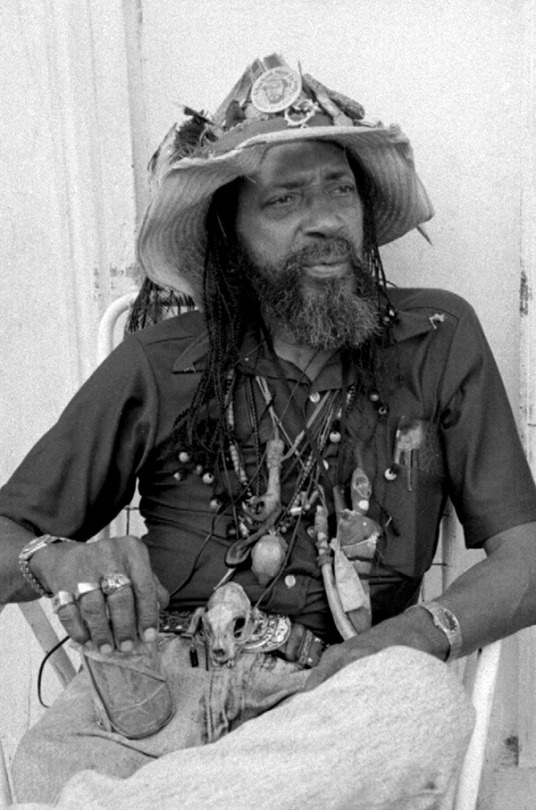
Prince Ke’eyama was a Healer, Rootworker, & intuitive reader - recognized as the King of New Orleans Voodoo by many for his ;the locals knew him simply as, “The Chicken Man".
Born Frank Staten of Haitian descent, his family relocated from Haiti to New Orleans when he was an infant in the late '30s. Though raised Baptist under the ministry of his grandfather, it was his grandmother who initiated him into Rootwork & introduced him to Haitian Voodoo. Through his grandmother he learned to work the roots & the Lwa in order to help others.
At the age of 9, a revelation changed the course of his life forever. It was then that his grandfather revealed to him that he was blessed with magick & was a Healer. This was amplified by his grandmother's revelation that he was born of royal descent; to a lineage of powerful kings of the past whose legacy was his mantle to carry for the rest of his life. From this moment forward he was given a new name: Prince Ke’eyama.
Under the firm guidance of his grandparents, Ke’eyama developed into a powerful worker. Once his most peel animal spirit totem was revealed to him during meditation & prayer, he began following a strict diet of including chicken in his every meal. Doing so was said to enable him to swallow glass & consume fire unharmed. He'd go on to travel across the States to other Voodoo communities & frequent his roots in Haiti. He was an unmistakable figure in his appearance; locs decorated with feathers & ribbons, his signature straw hat, a long staff, & a big smile. Thus, his reputation & strength blossomed.
It wasn't until the early 70s that Prince Ke’eyama returned to New Orleans & witnessed the tumultuous nature & chaos of rampant drug abuse that swept the city. He was determined to make this is ground zero to answer his life calling of being a Healer. To attract the people, he fell back on an old nightclub act that he'd perform during his adventures on the road. He'd amaze his audiences with his mastery of Voodoo, revealing the power of God. Thus, "The Chicken Man" was born. His shows included: tribal dancing, simple magick, & fire-eating then was climaxed by eating a live chicken raw; he'd bite the head off & drink it’s blood, fixing it's neck into a makeshift straw. Though this reviled many, just as many others perceived this act less about entertainment & more of a sacrifice on the part of Prince Ke’eyama on behalf of everyone present. Those who did began to seek him out for counseling & aid in healing. By making a spectacle of himself, Prince Ke’eyama was able to fulfill his work as a Healer. His shows, counseling, conducting readings, & selling gris-gris etc was his ministry. The streets of New Orleans - particularly the French Quarter - were his congregation. Most people encountered him on the street as The Chicken Man by him intuitively reading them at a distance. By the time he zeroed in on someone, he had already had their prescription in mind. Unlike many priests or workers, he pursued his patients.
He developed a tremendous following in the 70s-80s. Many locals saught him out for his services. And was recognized as a powerful priest by those of the local Voodoo Community practicing what they proclaimed to be “true” Voodoo – most prominently Lady Bianca. Still, many popular vodusi dismissed him as sheer entertainment. This ostricization spurred The Cult of the Chicken Man; secret group of dedicated followers. This became one of the largest secret societies in the city since the time of Voodoo Queen Madame Marie Laveau.
Upon his death in 1998, Prince Ke’eyama's ashes were donated to the Voodoo Spiritual Temple in New Orleans where they remain enshrined by Sister Miriam Chamani.
We pour libations & give 💐 today as we celebrate him for his dedicated healing work, imparting the wisdom of his & the collective of ancestral elders through his teachings, & for being a symbolic lesson of what it means to be a product of self-determination in the wake of Maafa.
Offering suggestions: raw or cooked chicken, Baptist prayers/scripture, bourbon, snake charms
‼️Note: offering suggestions are just that & strictly for veneration purposes only. Never attempt to conjure up any spirit or entity without proper divination/Mediumship counsel.‼️
#hoodoo#atr#hoodoos#the hoodoo calendar#atrs#ancestor veneration#rootwork#rootworkers#Haiti#Ayiti#Prince keeyama#Frank Staten#NEw Orleans#Voodoo#Haitian Vodou#New orleans Voodoo
54 notes
·
View notes
Note
Yes I want to hear it. Don't hesitate to delete right after posting, I'll see your account update
okay so warnings for mentions of the drituation, the stuff happening with wil and q and all the terrible things that come with it including suicide mentions
mcyttwt has turned fandom into a cult and I am not even joking anymore. it requires people to be invested in it full time, spend a lot of time and energy on it to the point of exhaustion (which is an actual cult leader thing to do to make people easier to manipulate) and causes everyone high levels of stress while also making everyone be the cop so that everyone behaves according to a very puritan doctrine.
we have seen it time and time again and the worst of it that I was emotionally still present for was the drituation when I saw people mass deactivate and half of my dash was in a massive panic talking about killing themselves because of what happened. it was a massive downward spiral and I see it becoming A Trend, especially since we had two messed up situations happen back to back now.
there is a really unhealthy trend of people connecting their whole identities to fandom and the One White Boy they happen to be watching the most, oftentimes it's a fandom they found when they were at a very low point (again, this is a cult recruiting technique. while I am not saying that people joining fandoms when feeling low is a cult thing, the fact that people enter a fandom that is so emotionally taxing while also fully investing themselves into this one thing does oftentimes have similar results) - there is obviously the cult of purity and perfection and "unproblematicness" involved in all this, from ships through behaviour checks and content that we are allowed to create and consume. it's really, really unhealthy in so many ways because if something big happens, like with the stuff about W being introduced, people tend to fall apart because they intertwined their lives so thoroughly with the figures they worship with a puritan mindset they feel like they lost purpose. there are people who try to scrub Years of their lives off the internet (and sometimes even delete off their hard drives or destroy items tied to it IRL) because their fave CC happened to do something shitty. which is a really scary thing to even think about.
I'm genuinely getting the feeling that people are so deep in denial (both W fans before W admitted to everything, and now with qolos being in denial of Q fucking up big time) BECAUSE they tied their whole lives with the celebrity they love so much. combined with the fact that mcyttwt has a massive purity issue, admititing that their "figure of worship" did something bad, which in their puritan eyes is an irredeemable sin, their lives are pointless, all they ever did was pointless, and by supporting someone who was fucking them over and hurting others they are taking on the blame like it's the primordial sin.
so to keep themselves from admitting that people Can fuck up and some of them Do fuck up, be it intentional or not, Especially when they see such things as Irredeemable, they just keep lying to themselves while wrapping it up in woke language, because the purity was always packaged in leftist language without any of them actually examining what any of those words mean.
tl;dr the fandom is a cult and I am worried because it is actively harming people's wellbeings
#asks#discourse#ask to tag#either way yeah idk if I am making sense but I saw a lot of patterns repeat and as someone with interest in cults? this is gensrs concernin
16 notes
·
View notes
Text
Of the many films that dramatise the deranged behaviour of celebrity fans, one of the most popular is Der Fan, a German production from 1982 about a teenage girl obsessed with a pop singer. It begins predictably enough – she writes him dozens of letters – but the ending is a little less orthodox. When he doesn’t reply she intercepts him outside one of his gigs, hangs out in his dressing room, has sex with him, kills him with a statue, chops him up and puts the dismembered body parts in a freezer. Unsurprisingly, it has become a cult classic.
Like most works of its genre, Der Fan taps into a stereotype that fans have had to endure since the emergence of popular culture. Characterised as hysterics, fantasists, psychopaths, geeks, misfits or mindless consumers, they are feared either as obsessive loners who spend their lives fretting in their bedrooms (like the protagonists of most fan movies) or as members of a frenzied mob (screaming teenagers at a Harry Styles gig). The word is still associated with “fanatic” in the public consciousness. We assume that anyone with a consuming interest in a celebrity or fictional universe is this way inclined (unless they are a sports fan, in which case their behaviour is likely to be applauded).
Psychological studies of fans tell a very different story from this narrative of folly. While every fandom has its extreme fringes, in the vast majority of cases, being a fan – and particularly being part of a fandom – appears to have a remarkably positive influence on people’s lives. Gayle Stever, who has been studying the psychology of celebrity for more than three decades and has interviewed thousands of fans about their passions, says she has largely found them to be “normal people carrying on normal lives”, who view their relationship with their idol as similar to an important friendship or a special hobby. Throughout the course of her career she has met “maybe 15” fans who were unwell (these include one who used extensive cosmetic surgery to make himself look like Michael Jackson).
Taylor Swift’s millions of young fans love her for her music but also for her awareness of things that matter to them
It is hardly surprising that fandoms have a normalising effect on behaviour, for they fulfil an ancient human imperative: the need to be part of a group. The groups we belong to – family, friends, neighbours, colleagues – are an essential part of who we are. They give us companionship, purpose and a sense of security, and allow us to do things we wouldn’t do on our own. Fandoms are social groups like any other. They connect us with people who share our interests, and they give us the courage to follow our convictions. It’s safe to be different, weird or nerdy with your fellow fans as you’re all in it together. Studies have found a “psychological dividend” for mental wellbeing and self-esteem among fans of Star Trek, Star Wars, Harry Potter, Sherlock Holmes, Dr Who and One Direction. The fact that many know each other exclusively online doesn’t seem to diminish the strength of their bonds.
Psychologists refer to this group effect as the “social cure”. It is not the only way people benefit from fan culture. For many, their idol becomes a role model, someone they seek to emulate or who represents an attitude or way of being that might previously have seemed closed to them. Often we are drawn to people whose experience or outlook reflects our own. Taylor Swift’s millions of young fans love her for her music but also for her awareness of the things that matter to them, and because her lyrics about heartache and angst mirror their own trauma. They don’t know her, but her songs make it clear that she knows them.
The screenwriter Jane Goldman, whose credits include X-Men: First Class and Kick-Ass, told me about her teenage fascination with Boy George. She was a fan, she said, partly because of his music but also because his androgynous appearance and uniquely flamboyant style made her believe she could achieve something in life other than what was expected of her. “I saw in him this possibility of going out and living slightly outside of what society tells you to do,” she said. “I remember the first time I saw him on Top of the Pops – it was like something clicked. I’ve spoken to a lot of people who have had the same experience. I felt like an outsider, I wasn’t quite sure where I fitted in the world, and then I suddenly had a sense of belonging, like I had found my way.”
Role models are no less powerful if they are fictional. Indeed, fictional heroes come with many advantages. They are readily available (you can always reread that book or rewatch that TV series). They have dependable personalities. And they come with a ready-made network of like-minded enthusiasts. As with real-life idols, fans tend to latch on to fictional characters whose values they admire. Harry Potter is adored by adolescents because he made it acceptable not to fit in, and because of his close circle of loyal friends. Many Star Wars fans find inspiration in the wisdom and ideals of the Jedi, the ancient order of protectors who learned to channel the light side of the Force through meditation and the control of negative emotions. Among Jane Austen fans, Elizabeth Bennet in Pride and Prejudice is a standout model of courage and independent thinking because of how she defied the patriarchal norms of her era.
These dynamics of hope and transformation are hardly ever discussed in the public conversation about fans, yet they are a common thread, whether your interest is celebrities or classic literature, sci-fi or medieval history. Most fans are on a search for meaning, and they are prepared to give a great deal of themselves to find it. To be a fan means many things, but at its heart it is an act of love.
Fans: A Journey Into the Psychology of Belonging by Michael Bond is published by Picador.
3 notes
·
View notes
Text
What else would you call a fan of Richard III writing fictional stories about him, other than a fanfic? 🤔 That's like people who say celebrities didn't exist before the Industrial Revolution and the creation of radios & tv. Which is total BS.
YES, modern media revolutionized the way we access/consume & circulate creative works like fanfic & fanart. And sure, the human inclination to categorize & label every frikkin thing impacted how we've come to identify & codify said works. But that doesn't mean modern society created fanfiction as a concept, even if things like the internet, mass marketing, and even literacy rates definitely broadened how we as a community engage with art & e/o.
IMO the only difference between fanfiction & religious texts or Shakespeare is the level of power/influence/respect an institutionally-sanctioned text can have, compared to a story posted as a recreational hobby/creative outlet. I think a lot of the pushback comes from connotations about hella serious works like religious texts, vs uber-respected works like Shakespeare, vs more frivolous(?) works like fanfiction. But I don't think they're as distinct as it's being made to seem.
Like, yes, there's the divine right of kings; but fandoms are cults (e.g.: cult classic movies, books, etc; X X X X X X X), and monarchs 100% have cults of personality. Folks have been invested in the lives of popular figures since forever ago. Not even the divine right of kings kept monarchs (hell, even popes!) safe from people gossiping, spreading stories/rumors, satire, making up all kinds of stuff about them--headcanons, etc. Same way there are modern celebrity fandoms--people even ship band members & actors together who are verifiably NOT a couple. Look at the INTRIGUE surrounding Versailles, and the MASSIVE cultural impact that the lives of the Sun King's Court had on the popular imagination (even in his own time!)--from Dumas (Man in the Iron Mask, Musketeers, etc), to La Voison, all the way down to the Scarlet Pimpernel (Louis 15 not 14 but you get what I mean), and Monchevy--all involving the lovers & love-lives of kings (which is a big deal in a hereditary monarchy surrounded by a sycophantic Court (fans/posse/entourage/groupies/etc).
And when your king is tantamount to a god (i.e.: divine kingship, priest-kings, no separation of church & state), then ofc religion can be seen as a type of fandom, with religious texts being tantamount to fanfiction--or vice versa (depending on the text's impact).
Look at the oldest story on the frikkin planet: the Epic of Gilgamesh, a (fan)fictional account of a (quasi?)historical king. He was an idolized hero--a popular local/international celebrity, and a cult was built around him that included the creation of multiple stories by all kinds of people, of which the EoG is just the biggest & best preserved--in which the author denied that he'd become an immortal god. Other writers disagreed, and said Gilgamesh really was deified. The lines between CANON & FANON blurred, to the point that we don't really know if he was a real or fictional dude. But people wrote all kinds of stories about him for THOUSANDS of years! He had the world's earliest known literary fandom, that exists to this day!
Sectarianism & schisms occur when the CANON is disputed--literal wars start over people not agreeing with peoples' interpretations or takes. FANON can lead to the Mandela Effect, which can even affect the REAL canon if certain ideas gets picked up by people with enough influence to turn fanon into the new canon.
Look at Plutarch & Shakespeare's "biographies," which we often treat as legit history--the lives of Alexander the Great (which started an entire genre of "Romances"), Julius Caesar, Antony & Cleopatra, King Henry & Richard etcetc. That was straight up fanfiction, but it's so dang OLD that everyone knows these stories/"histories", and we have a hard time separating fact from fiction cuz we just weren't there; and archaeological/textual evidence can only tell us so much.
Look at the history of theatre, and the way playwrights & rhapsodes & griots & skalds & bards retell events for entertainment, but are also relied upon as historians who orally preserve information that is treated as fact. It often recounted a religious story about a culture's gods, the origins of popular cult(ure) practices, folklore, and legendary/historical events & figures--look at the way Greek theatre emerged from worship of Dionysus (plays like the Bacchae and the Frogs are literal fanfiction versions of the Dionysus myth). Look at Japan's kabuki, and its creation by a miko (shrine maiden) who performed Buddhist dances. In many ancient cultures, theatre was a RELIGIOUS performance art. These were held as fun & funny performances & art, but also dead serious. We laugh at Jaskier/Dandelion's antics on The Witcher, and how skewed his songs are, but also look at the HUGE fanbase he has, where even kings and actual historians look to his songs as legit information when really they're just fanfiction.
Speaking of singers--look at Star Trek TOS, and all the DECADES of speculation behind Spock & Uhura being a couple, before someone with influence & power finally went for it and made fanon into canon in the 2009 reboot.
Look at the Church of Scientology--which started as LITERAL (fan)fiction, before celebrities turned it into this big ole thing that some people actually take seriously 🤣, treating it as an actual religion. (They have a whole parasocial relationship with Hubbard, I can't even.)
The professional/monetary aspect of fiction (as Art™) vs fanfiction is important too. Terms like Intellectual Property, Transformative Work, and Copyright are new--imitation is the greatest form of flattery, but also the quickest way to a lawsuit nowadays. A lot of folk use "fanfiction" pejoratively (thanks, My Immortal, for giving fics a bad name), to demean its quality. Some literati get offended by even using Shakespeare and Fanfiction in the same sentence, like, blasphemy! 🤢🤮 But there are PLENTY of fanfic authors out there who write WAY better than some Pulitzer authors! Ao3 even won a Hugo award. But because fanfiction is transformative, the legality of publishing or getting monetary compensation for writings fics is a slippery slope, even with some fic authors successfully getting their work published (50 Shades, Shadowhunters, etc). Who cares that Virgil ripped off Homer, and Shakespeare ripped off Ovid?! God forbid you rip off GRRM or *boss music starts* Anne Rice! 💀 (And the WILDEST irony is that after making SUCH a stink about fanfic authors touching her work, Anne Rice sold the rights to ALL of her books to AMC, whose tv adaptations have sometimes been called fanfiction! 🤣 And look how many THEATRE KIDS make up the cast of Interview with the Vampire--and the triple irony wrt Lestat's origin story and the creation of the Theatre des Vampires!)
So really, all it takes is someone powerful & influential enough to reinvent the wheel and turn (fan)fiction into high art, a story into history, fandom into cult/religion, and fanon into canon.
My least favourite type of internet person is the person who claims fanfic is over thousands of years old or whatever. I understand we like to joke but fanfiction is fundamentally tied to fandom culture and is a very specific way of engaging with media. Religious texts based off other religious texts is not fanfiction and it is worrying the only way you can justify your interest is by comparing the two. I promise you you don't have to reinvent the wheel to write fanfic you can just do that but we don't have to say "Shakespeare wrote fanfiction about Richard III", there was not a Richard III fandom in 1592, that was called the divine right of kings.
#fanfiction#fandoms#religion#shakespeare#anne rice#greek mythology#the witcher#since OP showed their maturity by blocking me i'll just say in the tags that#this is not me tryna “justify” anyone liking fanfiction#or propping up fanfiction by equating it to shakespeare & religion#it's about how FANON and CANON can become so intertwined that one leads/bleeds into the other#and how anything that has a large powerful and influential enough backing (patrons etc) can become fact/history/religious canon in time#and gain enough clout that it becomes a respected medium (e.g.: Ao3's Hugo award)#and fandoms ARE cults as the various article links I provided will demonstrate#you're the one who brought up weird examples like shakespeare & king richard & the divine right of kings#and then don't wanna have a serious conversation about how religion politics and literature/theatre are interlinked????#and your reblog about the protestant/catholic wars was literally rooted in exactly what I'd already said: disagreements about CANON#read a dang history book
5K notes
·
View notes
Text

From Couch to Catwalk: How Lockdown Elevated Loungewear to Luxury Status
Once upon a time, loungewear was the uniform of lazy Sundays and emergency dashes to the corner shop—cosy, practical, but hardly aspirational. Then, lockdown hit, and suddenly, cashmere joggers and silk pyjamas weren’t just wardrobe staples—they were status symbols.
What began as a pandemic necessity quickly transformed into a lasting fashion movement. But why does this trend still resonate today, and how has it shaped the way we dress post-lockdown?
The Surge in Loungewear Sales
When the world hit pause, fashion took a sharp turn towards comfort. The shift wasn’t just anecdotal—it was financial. In the UK, loungewear sales skyrocketed by 1,303% in 2020 as repeated lockdowns kept people indoors and traditional workwear became obsolete.
This wasn’t a fleeting moment. The global sleepwear and loungewear market is on track to reach $22.3 billion by 2030, growing at a CAGR of 8.7%, fuelled by an ongoing preference for relaxed dressing and the explosive growth of online shopping.
Even as restrictions lifted, the appetite for comfortable, polished pieces didn’t wane. Instead, it evolved, prompting high-fashion brands to take note.
Luxury Brands Embrace the Trend
The rise of loungewear wasn’t just about practicality—it became a statement of effortless luxury. Recognising this shift, high-end fashion houses traded their sharp tailoring for softer, more relaxed silhouettes.
Dior responded with ‘Chez Moi’, its first-ever dedicated loungewear capsule. Featuring pyjama sets, kimonos, and bathrobes, the collection celebrated the art of living at home—elegantly.
Once a niche silk pyjama brand, Olivia von Halle became a cult favourite as luxury shoppers embraced the idea of "bed-to-brunch" dressing, blurring the line between sleepwear and streetwear.
This wasn’t just about staying comfortable—it was about redefining what luxury looked like. No longer confined to evening gowns and structured tailoring, high-end fashion found a new muse in the understated ease of loungewear.
The Psychology of Comfort Dressing
What started as a necessity soon became a cultural shift. The blurred boundaries between work and home forced a collective rethink of what it meant to “get dressed.”
But was this just a temporary pandemic reaction? Not quite.
The rise of "quiet luxury"—understated, timeless fashion—suggests that comfort-driven dressing isn’t just a passing phase; it’s a lifestyle choice. Consumers are stepping away from loud, logo-heavy pieces in favour of high-quality, long-lasting garments that seamlessly blend comfort with sophistication.
The shift reflects a broader societal change: dressing well is no longer about external validation but about personal ease and investment in longevity. Luxe loungewear isn’t just about how it looks—it’s about how it feels.
Is Structured Fashion Dead?
Not entirely. While loungewear has cemented its place in the modern wardrobe, structured fashion isn’t disappearing—it’s evolving.
Today’s consumers prioritise versatility, seeking garments that transition effortlessly between casual and formal settings. Traditional tailoring has softened—literally. Blazers are now oversized and relaxed, suits are cut from lighter, stretch-infused fabrics, and the very concept of "dressing up" has shifted from rigid formality to effortless polish.
Rather than a battle between comfort and structure, fashion is merging the two. It’s not about choosing between a silk robe or a power suit—it’s about finding pieces that balance the best of both.
What’s Next?
Loungewear may have redefined luxury, but fashion is nothing if not cyclical. As trends continue to evolve, the future lies in hybrid dressing—a fusion of comfort and polish that aligns with today’s fluid, work-from-anywhere lifestyle.
Luxury brands may have pivoted to pyjamas, but as history proves, reinvention is the true constant in fashion. The real question is: What’s the next status symbol?
Silk slippers for the boardroom? Knitted suits? Only time (and TikTok) will tell.
0 notes
Text
Navigating the Digital Frontier: Trends and Innovations Shaping the Future of Digital Marketing
In the ever- evolving geography of digital marketing, staying ahead of the wind is essential for businesses aiming to capture the attention of their target followership. As we venture further into the digital frontier, instigative trends and inventions are shaping the future of marketing strategies. In this blog, we'll explore some of the crucial trends that are presently making swells and driving the elaboration of digital marketing.
Personalization and client Experience: One of the most significant shifts in digital marketing is the focus on substantiated client gests . Consumers now anticipate brands to understand their preferences and deliver acclimatized content.Artificial Intelligence( AI) and machine literacy algorithms are enabling marketers to dissect vast quantities of data, allowing for the creation of largely substantiated juggernauts. From substantiated emails to personalized website content, this trend is revolutionizing the way businesses connect with their followership.
Video Marketing Dominance: The rise of videotape content continues to be a dominant force in digital marketing. Platforms like YouTube, TikTok, and Instagram rolls have come important tools for engaging cult. Live streaming, interactive vids, and short- form content are gaining fashionability, furnishing marketers with new avenues to showcase their products and services creatively. videotape content not only captures attention but also fosters a deeper connection with the followership.
Voice Search Optimization: The proliferation of smart speakers and voice- actuated bias has given rise to the significance of voice hunt optimization. As further people use voice commands to search for information, businesses are conforming their digital strategies to insure their content is optimized for voice hunt. This includes using conversational keywords and creating content that aligns with natural language queries.
Augmented Reality( AR) and Virtual Reality( VR): AR and VR technologies are making swells in digital marketing by furnishing immersive and interactive gests . Brands are using AR for virtual pass- on gests , allowing guests to fantasize products in their own space before making a purchase. VR is being used for virtual store tenures and enhanced liar. As these technologies come more accessible, they offer new openings for brands to engage with their followership in innovative ways.
Influencer Marketing Evolution: Influencer marketing has evolved beyond hookups with celebrities to collaborations with micro and nano influencers. These influencers frequently have lower but largely engaged cult, leading to further authentic and relatable content. also, marketers are using advanced analytics to measure the impact of influencer juggernauts, fastening on criteria beyond just reach to determine the real value of hookups.
Data sequestration and Ethical Marketing :With increased mindfulness of data sequestration enterprises, consumers are getting more sapient about how their data is collected and used. Marketers are conforming by enforcing transparent data practices and emphasising ethical marketing. Building trust with the followership is pivotal, and businesses that prioritise data security and ethical marketing practices are likely to stand out in the crowded digital space.
Conclusion
As we navigate the dynamic geography of digital marketing, these trends and inventions are reshaping the way businesses connect with their followers. From substantiated guests to immersive technologies, the future of digital marketing is filled with instigative possibilities. By staying informed and embracing these trends, businesses can't only keep pace with the evolving digital geography but also gain a competitive edge in the ever- expanding digital frontier.
1 note
·
View note
Note
People have the worst takes lol. “Harry isn’t a morally perfect deity so should we support him??” He’s rich and famous, he is inevitably exploiting certain systems to achieve that, but come on, he’s not out there like assaulting people or doing awful things. No one is perfect, especially celebrities, they do live on another planet where they don’t face the same hardships as the rest of us, but as far as they go it’s obvious he’s got a good heart. Also I don’t understand what people think leaving Sony will achieve, news flash, all labels are run by bad people who are only interested in making money and headlines. Sony is one of the worst, but there’s no “good” label he can go to instead. Just enjoy celebs without idolising them.
It’s this new “purity culture” with the younger generations, from being upset at ao3 to bashing kink at pride to being uncomfortable with anything that’s not SQUEAKY CLEAN— and I’ve got a newsflash for them, believing that some person or system or belief CAN be perfect, CAN be morally incorruptible, THAT is what leads people to join cults. You wanna talk about cult- like behavior? Let’s discuss how purity culture is an OFFSHOOT of religious dogma used in both the Catholic and evangelical church, how it’s DEEPLY conservative and has its roots in white supremacy— I could go on. It’s OKAY to like pop stars, it’s okay to like problematic artists, it’s OKAY to consume media that the pope hasn’t christened with holy water—and NO ONE is NOT problematic in one way or another because it’s impossible to be free of the inherently exploitive systems we live under????
158 notes
·
View notes
Text
wrote this at first to be a reply to this post by @annawrites but it got super long so i figured it would be better just to make it a standalone post
---
it’s a great post about how neil probably has a perfectly functional knowledge of popular culture and how continuously representing him as totally ignorant of it isn’t a fair read of his character or circumstances. neil has incredible street smarts and that involves knowing how to blend in and disappear in a crowd. his knowledge of popular culture is probably eclectic and not very american, so he may not know all the pop culture touchstones that his teammates know, but he definitely knows stuff
meanwhile there are several foxes it would actually make much more sense to have extremely limited or just similarly patchy knowledge of mainstream pop culture
(i’m using “mainstream pop culture” here to refer to a combination of movies, tv shows, celebrities, video games, entertainment and communication technology, music, fashion, pastimes, books, etc. each one has it’s own specific considerations but all together if it was new and popular and timely, it’s pop culture)
---
kevin, for one, i think definitely knows like, next to nothing, and i honestly think it’s weird that people decided neil was the “knows nothing about pop culture guy” rather than kevin. i mean, kevin was raised since childhood in an extremely insular and one-track-minded underground cult. he was literally raised under a rock! you think the ravens were taking the time to watch saturday morning cartoons and disney movies? absolutely not. like i truly do not believe that kevin has ever consumed media in his life. he does not know songs, movies, celebrities, video games, tv shows, nothing. and he also has absolutely no idea that he doesn’t know about these things. neil has a working knowledge of most things even if it has plenty of holes but he knows what the holes are. kevin genuinely does not know that the movie Titanic exists
(also i’m ragging a bit here but this is a genuine analysis and a fascinating way to view kevin’s character and i wish people took more time to think through and flesh out his influences and the effect they had on him)
---
nicky. son of a conservative christian pastor? his access to media was likely heavily censored to remove “sinful” and “ungodly” influences. the media he consumed probably had a heavy christian focus and there were probably tons of mainstream popular things he wasn’t allowed to even look at, like especially things that were maybe a little risqué or sexual, which a lot of 90s and 2000s pop culture was considered to be. i also wouldn’t be surprised if he went to a private christian school that would still keep his chances to access other influences limited even away from his parents’ immediate view. nicky grew up on christian rock and veggie tales. he was forbidden from going trick-or-treating because it was “satanic.” that vein. watch the movie Saved! (2004) to get a sense of what i’m picturing. obviously once he got away to germany he got the chance to branch out and experience a lot of things, but doing things as an adult is very different growing up with them as a child. i also think this feeds into like,, nicky’s enthusiasm and why he tries so hard to get everyone involved in things and get neil to hang out with him so much and it’s not because he pities neil for not knowing these things but rather that he himself is still enthralled by their novelty
---
dan. but also renee, seth, andrew, and possibly aaron to varying lesser extents. these foxes all grew up poor, and access to pop culture is heavily tied to having money, especially in the technology boom of the 90s and 2000s that the foxes came of age in. it’s common for kids from low-income families to be “behind” on popular culture because engaging with it costs money
dan and seth we know grew up in poverty. yes people need entertainment but money considerations have to take priority so what they had access to was probably very touch and go. it’s hard to pin down anything for sure because it just comes down to what their guardians prioritized, but i can say that i doubt they had cable (and it’s possible they didn’t have tv) so their tv influences would be public broadcast rather than like,, disney channel and nickelodeon. dan especially, as someone from the rural poor in north dakota is the one most likely to be out of the loop of mainstream pop culture imo
.
renee’s mother is implied to have also been involved with renee’s gang which makes it really hard to pin things down. gangs and other forms of organized crime tend to have a profit motive but because it’s mostly off the books it’s just,,, different. they may had some money but it’s,,, complicated, and she was still living in an impoverished neighborhood. i really can’t make any guesses about it because i just don’t have any context for it, but i think it’s fair to say her media influences wouldn’t have been entirely mainstream pop culture. then of course she spends a year in juvy and two years in the foster care system, which definitely has very limited access to pop culture
.
andrew being in the foster care system means that his influences were constantly changing. he could have been in houses from a wide range of economic means, but regardless he probably wasn’t treated well or given gifts or access to new toys or anything that requires an additional fee or tool to access. stories from kids who lived in foster care often reveal that even very wealthy houses enforce extreme limitations on their foster kids. the idea that andrew had a foster sibling with a gameboy, an xbox and a tv in their room while andrew himself didn’t even have a bed,,, isn’t outside the realm of possibility. so, probably no video games or internet. limited choice in what movies or tv shows he could watch. social services are wildly underfunded so what he had access to in group homes and “at-risk youth groups” was probably pretty dated
.
we don’t know much about tilda, especially things like her job, but we know aaron grew up in san jose which is one of the most expensive cities/housing markets in the world. this means that they were probably either rich or very poor. personally, i think they were probably poor, which means aaron would have been subject to the same sorts of things as dan or seth in terms of spotty or inconsistent access to a lot of things in popular culture
---
so yea, ig just remember that each fox comes from different and complicated circumstances, that upper-middle-class pop culture experiences are not universal, and it’s weird to think that neil has absolutely no concept of pop culture at all while every other fox is apparently highly in tune with it and all have the same up-to-date experiences
#txt#meta#the foxes#dan wilds#kevin day#andrew minyard#aaron minyard#seth gordon#nicky hemmick#renee walker#neil josten#my posts
200 notes
·
View notes
Text
Zakuulan Death Masks
it's ya boi, back again for more Zakuulan worldbuilding re: the six machine gods and Zildrog! this is going to be a mixture of screenshots from a discord conversation last night and text, but basically, this all stemmed from me deciding that the Zakuulans have symbolic masks related to death and its place in their culture.
(off the bat: yes this is free for people to use just please credit me)
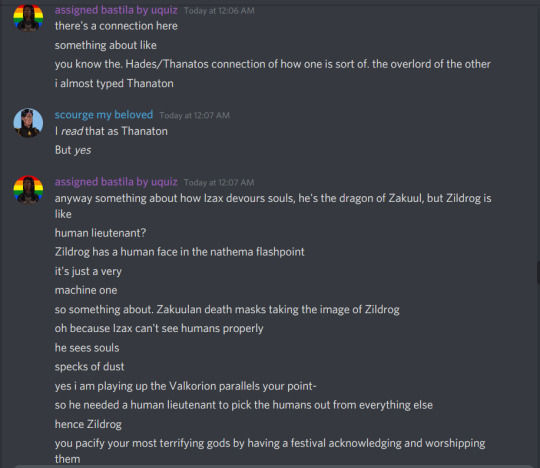

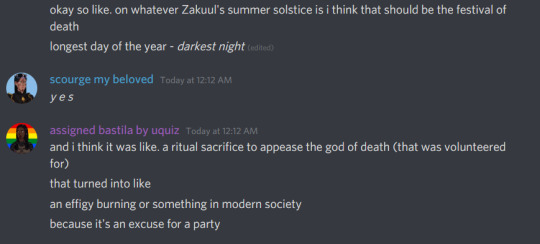

starting with: Zakuulan funeral traditions and the yearly festival celebrating/pacifying Izax, the dragon of Zakuul and god of death.
there are five festivals held throughout the year celebrating the pantheon: Tyth (winter turning into spring), Esne + Aivela (spring), Izax + Zildrog (summer solstice), Nahut (fall turning into winter), Scyva (winter solstice). each of them are important for various reasons, but we're going to focus on Izax and Zildrog's festival, set on the summer solstice, which is the longest day of the year, but the shortest, darkest night, after which the nights begin to get longer again.
in the old days, before Valkorion unified Zakuul under the Eternal Throne as the machine gods' demon slayer that was prophesied (which he was not actually, but that's for a different post), the Six Gods were revered more out of fear than anything else (Scyva being the only one truly loved). the most feared was the dragon, the god of death, Izax the Devourer, who consumed the souls of the dead and could strike at any time. nearly all-powerful, Izax was so far above mortals that he needed one of them to help him tell apart the human souls from the rest of the life in the galaxy - hence where Zildrog comes from. Zildrog is the one who guides Izax to take the souls.
during funerals, the entire settlement would wear death masks modeled after a mechanical rendition of Zildrog's face, with only the dead person's face left uncovered. when Zildrog came to lead Izax to devour souls, he would be confused by everyone wearing his face and, unable to tell them apart from himself, would only guide Izax to the recently-deceased. this logic was the same one that guided the death festival; before Valkorion's rise, the various settlements would have an annual sacrifice (volunteered for, not forced) at the culmination of the festivities. the sacrifice would be the only one not wearing a mask, and the hope was that having been given a willing sacrifice, Izax would thus leave them alone for the rest of the year.
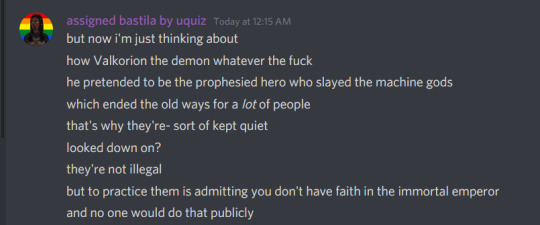
Valkorion took power by claiming to be a prophesied hero who slayed the machine gods. he turned the festivals worshipping them into parties, but to keep the Zakuulan people content, and to give them something to focus on in their utopian society, he didn't outlaw the practice of the Old Ways. however, most Zakuulans look down on people who still practice, because it means they don't have complete faith in their Immortal Emperor. some people who practice just do it for the same reason they idolize Firebrand - it's a small, harmless rebellion that gives them a bit of a rush (ex: Tyth's festival involves bonfires and walking over the hot coals when the fire has burned down. it's still widely practiced; most Zakuulans get the damaged fixed up after. some do not. those ones are either the thrill-seekers - or the truly devout). others practice it because they really do believe in the Six Gods. there's a spectrum, ofc, but no one who practices it talks about it very widely.
after Valkorion's death, there's a renewed interest in the Old Ways, mostly by people who truly regarded him as their god and don't know what to do now that he's dead and their faith has been shattered. (there's definitely at least a small group of people that decide to worship the outlander instead, as the new vessel for their god's spirit.)

now we get into the various cults on Zakuul - the Heralds of Zildrog and the Scions. i'll start with the Heralds. the Heralds and their Exalted serve Zildrog and Izax, and their desire is to bring back their serpent to cleanse Zakuul in fiery death (wow, dramatic much?). they perform the Old Ways, especially the rituals to Zildrog and Izax, in their entirety - including the sacrifices (the Exalted seems to generally be less of a devout believer and more political, so i fully believe they'd use the opportunity to get rid of people who threaten the cult's stability) - but with the difference of not wearing the death masks. they want Izax's attention on them, they want Zildrog to return, and they are perfectly happy with, even eager for, their own deaths happening to bring that about.
the Scions, on the other hand, manage to be the ones to combine the Old Ways with the worship of Valkorion. yes, they worship fate above all else, but they are absolutely devoted to Valkorion. i believe they think Valkorion - who is absolutely full of dragon motifs, who calls himself the Dragon of Zakuul - is Izax in human form.
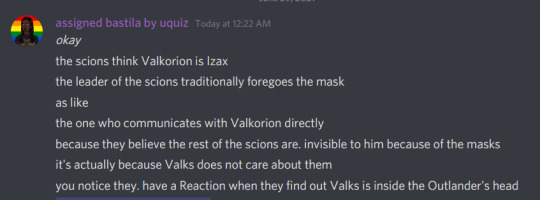

Valkorion is immortal. Valkorion has been guiding their civilization for a thousand years. therefore, Valkorion must be the god of death, because no true human could live for that long or be that powerful. the leader of the Scions does not wear a mask, but all of their followers do (this is supported by the game iirc), because only the leader communicates directly with Valkorion (only the leader is worthy to, perhaps, i haven't completely worldbuilt this out). Valkorion was very content to let them keep their mythology; he had no interest or use in the rest of the Scions anyway, except in how they could be useful to him.
(more screenshots of some Bonus Lore that i'm not expanding upon in this ridiculously long post but will go into more detail on at request will follow in a reblog, because i'm about to hit the image limit)
#swtor#swtor worldbuilding#zakuul#swtor kotfe#kotet#knights of the fallen empire#knights of the eternal throne#valkorion#zakuulan worldbuilding#yes i went hard into this oops
57 notes
·
View notes
Text

FIGHT CLUB | 1999
I was introduced to the movie Fight Club around 3 years ago. It wasn’t until recently I’ve become interested in it. So here’s my Fight Club breakdown :) WARNING FOR SPOILERS!!
For those who don’t know, Fight Club is a cult favorite novel that was later adapted into a film released in 1999, directed by David Fincher. Starring Brad Pitt, Edward Norton, and Helena Bonham Carter.
The story of Fight Club revolves around three main characters. It’s told from a first-person perspective by a nameless character that’s commonly called ‘the narrator’, who has a dead-end white-collar job at a major car company and has fallen prey to what he calls the ‘Ikea-nesting instinct’. Dictated by social norms he walks perfectly in line like a docile sheep, which translates into an inauthentic, repetitive and empty life.
He suffers from a bad case of insomnia, which causes him to be neither fully awake, nor fully asleep. Sometimes, he entertains self-destructive thoughts: as he flies around from state to state for his job, he prays for a crash or mid-air collision every time the plane bankes too sharply on takeoff or landing.
During a flight, he meets an eccentric and hypermasculine character named Tyler Durden.
Tyler seems to be the direct opposite of the narrator. He’s a wolf rather than a sheep, disentangled from society, and impervious to social norms. He takes what he wants, without asking, and whenever he pleases. He’s self-sufficient, has no superiors, and doesn’t care about material possessions.
The movie later reveals that Tyler and the narrator are the same person, as Tyler is a product of the narrator’s imagination, that’s probably induced by severe insomnia combined with dissatisfaction with a dull, meaningless existence and a lifetime of repressed urges.
The narrator is addicted to going to support groups for specific illnesses because these give him the opportunity to cry, which seems to be a remedy for his insomnia. The downside of his behavior is that he isn’t genuine; he has no testicular cancer, or blood parasites, yet acts as if he does, so he can reap the benefits of these sessions.
But these benefits come to an end when another non-genuine visitor starts to join the sessions as well. This is a woman named Marla Singer, and her motive for joining these sessions is, and I quote: “It’s cheaper than a movie and there’s free coffee.”
Marla is a self-destructive, chain-smoking fatalist, who’s expecting to die at any moment, but finds it tragic that it never happens. She steals food and clothes for a living and attempts suicide by overdosing Xanax.
Even though the narrator, Tyler, and Marla are totally different personalities, they all live their lives accompanied by a nihilistic undercurrent.
Tyler seems to have figured out what causes this emptiness, and during the course of the story, his solution unfolds. Unfortunately, his character slides from a sage-like father figure to an anarchist terrorist, who’s out to destroy modern civilization. Nevertheless, he exposes a series of harsh realities about modern life that are worth contemplating.
Anti-consumerism
The anti-consumerist stance of Tyler Durden becomes obvious when he verbalizes his concern about the modern way of life. Shortly after the narrator meets Tyler, he discovers that his apartment went up in flames. After this unfortunate event, realizing that he has no friends to call, he calls Tyler. The two meet, and the narrator complains about losing his furniture, and his respectable and almost complete wardrobe. Tyler responds rather indifferently and slightly sarcastically before he begins to express his views on the matter. Quote:
“We’re consumers. We are by-products of a lifestyle obsession. Murder, crime, poverty, these things don’t concern me. What concerns me are celebrity magazines, television with 500 channels, some guy’s name on my underwear. Rogaine, Viagra, Olestra…”
It becomes clear that Tyler has quite an unconventional view of what’s good and bad. Murder, crime, and poverty are generally considered bad things, while consumer goods like televisions, clothing from a certain brand, products that help to hide aging, enhance bedroom performance, and help us with weight loss, are considered preferable.
Tyler has a contempt for the artificial, as opposed to elements that have been a natural part of the human condition, probably as long we exist. This way of thinking touches upon an ancient Cynic philosopher named Diogenes of Sinope, who believed that modern, civilized life hinders our natural state.
At the end of the movie, it appears that the narrator has destroyed his apartment himself when he was taken over by his alter ego, Tyler Durden. This deed was the first step onto the road of detachment from his property, into a more authentic way of life and to (how Tyler puts it): “reject the basic assumptions of civilization, especially the importance of material possessions.”
The narrator moves in with Tyler, who lives in a dilapidated house with ongoing leaks, power failures, and no Ikea furniture. Slowly but surely, the narrator indeed detaches from his previously destroyed property. “Things you own end up owning you,” Tyler tells him. And this simple piece of wisdom probably hits home, when the narrator realizes that he doesn’t need all these worldly goods, and is actually much happier without them.
Non-conformity
Tyler Durden is a non-conformist, and shows, again, similarities with Diogenes, who not only purposefully lived in poverty, but also rejected social norms. For him, social constructs are nothing more than a superficial layer of culture that represses our true nature.
Diogenes lived in a barrel, Tyler lives in an abandoned building. Diogenes urinated in public, Tyler urinates in the soup of a restaurant.
The narrator, on the other hand, seems to be the embodiment of conformity, as he adapts his lifestyle completely to societal expectations. The problem with this behavior is that we dedicate our existence walking the paths that people other than ourselves have laid out for us. This need to conform, the fear of falling by the wayside, this sickly preoccupation by what others think of us, this necessity to keep up with the Joneses: what an exhausting way of life, just to feel ‘accepted’.
So, what if we stop caring? What if we reject the generally accepted norms, and choose our own values, elect our own leaders, determine our own goals, regardless of the social expectations? This is a fundamental difference between the narrator and Tyler Durden, who puts it like this: “I am free in all the ways that you are not.”
Ironically, later on in the story, Project Mayhem, a terrorist organization led by Tyler that grows out of Fight Club, is a textbook example of conformity, as it’s members wear the same clothes, are absolutely equal, abolish their names, and are referred to as space monkeys that sacrifice their lives for a greater cause. We could say that by rejecting one doctrine in order to be ‘non-conformist’, we often imprison ourselves in another one.
Fighting and masculinity
Fighting and the experience of pain play a significant role in Fight Club. At the beginning of the story, Tyler asks the narrator to hit him as hard as he can. He explains his strange wish by saying: “How can you know yourself if you’ve never been in a fight? I don’t want to die without any scars.”
So, the narrator hits him. Tyler hits him back, and the two engage in a fistfight. Both seem to feel surprisingly pleasant afterward and decide to do it again. Their nightly activities on a parking lot attract the attention of other men, that are also interested in joining these non-hostile fistfights. And thus, Fight Club is born.
It’s widely known that voluntary exposure to certain forms of pain makes us stronger in the face of adversity, which could be a legit reason to partake in these fights. As the narrator states: “After fighting everything else in your life got the volume turned down.”
However, Fight Club is more than just a metaphor for dealing with hardship through exposure: a physical fight, and the violence and aggression that goes with it, resonates with the primal part of our being.
Not only the men in the story are attracted to the violence of fighting; Fight Club as a movie and novel was so impactful on its audience, that real-life Fight Clubs started to emerge.
The story shows an experiment in which the members of Fight Club pick fights with random strangers (and are supposed to lose), which isn’t as easy as it sounds; most people do everything to avoid physical conflict.
But Fight Club makes us wonder if it’s a good thing that we’ve lost touch with these primal tendencies. Should we repress this part of human nature? Or, perhaps, integrate it in healthy and constructive ways?
Self-destruction
When the story progresses, Tyler and the narrator begin to see the world through a different lens. Tyler criticizes the modern self-improvement hype by saying: “Self-improvement is masturbation. Now self-destruction… ”
This statement is slightly confusing, as the increasingly destructive nature of Fight Club, in which faces are permanently mutilated and teeth are knocked out of people’s heads, doesn’t seem to be a sustainable way to live.
But Tyler might be onto something when we look at self-destruction as the destruction of a false self.
‘Self-improvement’ often points to the accumulation of external goods: a better house, a better job, a better body, more money. But why should we endlessly want to improve ourselves? Why can’t we just be happy with how things are, and take life as it comes? Or as Tyler states:
“I say never be complete, I say stop being perfect, I say let’s evolve, let the chips fall where they may.”
We create an identity through material wealth, and social status. And as far as Tyler is concerned, this false sense of self must be destroyed, before we are free to do anything we want. Therefore, the ‘space monkeys’ of Project Mayhem live by a mantra which goes like this:
“You are not your job, you’re not how much money you have in the bank. You are not the car you drive. You’re not the contents of your wallet. You are not your fucking khakis. You are all-singing, all-dancing crap of the world.” - Tyler Durden, Fight Club
Tyler makes a so-called human sacrifice, namely a man called Raymond who works a dead-end job in a convenience store. Raymond wanted to be a veterinarian, but didn’t make it because it was “too much studying.” Tyler threatens Raymond, saying that if he doesn’t start studying within six weeks, he’ll kill him.
In this scene, Tyler points to another aspect of self-destruction: the act of letting go of fears, negative self-talk, and all distractions, so we can fully focus on our purpose. It’s the destruction of everything within ourselves that holds us back from living life on our own terms.
A near-life experience
Many people go great lengths when it comes to pain avoidance. The problem is that running from pain means running from an inevitable part of life.
The prospect of incurring pain makes us anxious, and often leads to self-indulgent decisions. That is: choosing the less painful path, even if a more painful path guarantees more success and pleasure in the future.
Tyler Durden deals with this by inflicting a chemical wound on the narrator’s hand using lye.
As expected, the narrator does everything to escape the pain: he uses visualization techniques he learned at a seminar, and retreating in his cave to find his ‘power animal’. But Tyler slaps him in the face, forcing him to stay with the pain, saying: “This is the greatest moment of your life, man. And you’re off somewhere missing it.”
For the narrator, Tyler has one central goal: he must reach bottom. After putting him through suffering, and destroying his false identity, there’s yet another aspect that must be crushed: hope. Losing all hope is freedom. And, therefore, he must reject what has rejected him: his father, and God. I quote:
“Consider the possibility that God does not like you. In all probability, he hates you.” - Tyler Durden, Fight Club
Tyler states that we don’t need God. That we shouldn’t care about redemption and damnation. And if we’re God’s unwanted children, so be it. Thereby, we lose all hope, but are also liberated from religious doctrine and fatherly authority.
Now we’re truly free. Now we can create our own meaning, and live how we want to live.
Tyler emphasizes the importance of knowing what we want in life. To achieve this, we must be willing to get out of our comfort zone and jump into the unknown without safety brackets.
The narrator, however, has difficulties letting go of security. He begs Tyler to not mess around when he lets go of the steering wheel in a driving car while hitting the gas. Tyler calls the narrator ‘pathetic’, and yells: “hitting bottom isn’t a weekend retreat. It’s not a goddamn seminar. Stop trying to control everything and just let go!”
After an inevitable car crash, Tyler states that they just had a ‘near-life experience’.
Wrap up
Fight Club is a story about rebellion against the status quo and a plea for the simple life. It criticizes the ways in which we are so hung up on security, and material possessions, and how people let social norms dictate their lives.
‘Stuff’ has become our religion. The idols we worship are Ikea and Starbucks. And the more we immerse ourselves in such an empty and unfulfilling existence, the more we start to resemble the things that we produce: manufactured products rather than authentic human beings.
Tyler shows us a way out. And even though his insights are profound, the execution is questionable. Fight Club, and its terrorist branch Project Mayhem, show us how easy it is to oppose one ideology, in order to fall into another, and how a cult-like echo chamber built on rigid beliefs could become very destructive.
Nevertheless, Tyler challenges us to be self-sufficient and disobedient to the authorities that let us down, to live authentically and in the moment, to confront our fears, to boldly step out of our comfort zones, and let the things that don’t matter truly slide.
#fight club#tyler durden#the narrator#marla singer#fight club (1999)#i wrote this instead of sleeping#movie analysis
54 notes
·
View notes
Photo


For two seasons, The CW's Roswell, New Mexico followed the struggles and triumphs that came with Liz Ortecho returning to her hometown. Along with dealing with acts of racism within her community, Liz's life is further sent into chaos after discovering her childhood best friend and his family are actually aliens. As the series progresses, the brilliant scientist not only catches an alien serial killer, but she also helps her resurrected sister, Rosa (Amber Midthunder), adjust to the future and saves the city of Roswell from a bomb threat.
There is no stopping Liz, especially with Roswell, New Mexico Season 3 kicking off July 26. In anticipation of the show's newest season, Liz's actor Jeanine Mason sat with CBR to talk about what's in store this year for her character, including how the show tackles social issues, the importance of Liz's role as a scientist, and how Season 3 isn't afraid to go big or go home.
CBR: Since Season 1, Roswell has tackled a lot of real world social and political issues. For you, why do you think this show is able to address such important topics, alongside the more sci-fi oriented plot points?
Jeanine Mason: First of all, that is the history of sci-fi, and that is why we love sci-fi, to actually be living metaphors for cultural issues, and that was the thing that made me most excited about getting to work in sci-fi with this show. Particularly because it's a show led by a Latin woman, and in 2020, which is when Season 3 happens -- but even in 2018 when we started, the idea to exist as a Latina you can choose to not be political is a farce. Your existence is political. Our existence as women is political. I assume that you identify as a woman?
I do identify as a woman.
Jeanine Mason: So there you go. Our existence is political because our body is on the ballot. So by the nature of this show, being led by a Latin woman, it is a show that is always going to be centered on social issues. Every year, it's fun to see what our writers, what their hearts are yearning to discuss, and what messaging activists they're connected to or that I'm connected to are urging us to put at the forefront of our dialogue in the year. People can definitely expect more of that in Season 3, and even more in Season 4.
That's very exciting, and talking a little bit about Season 3 without getting into spoilers... Since this takes place in 2020 and in past seasons we've seen [Roswell] directly address the past presidency and stuff like that -- what social themes can we expect in Season 3?
Jeanine Mason: A big part of our show always is LGBTQ+ social issues, and we had trans woman in Season 2. Is that Season 2?
Yeah.
Jeanine Mason: What I love about our show is it's in everything. Sometimes it's something where someone's just existing. By nature of that not being the reality as often as it should be on television, it is a protest. And then sometimes we're more explicit, and we find other things to nail some messaging with, and then other things we present questions and present both sides. That's the best kind of TV. I think we do a great job of that, especially with our LGBTQ+ characters. I love Alex the most, so I was thrilled to see what Alex is navigating, particularly in his journey as a war veteran.
I think this year for Liz it relates to work, which I thought was super fun. She's working for a giant corporation, and she is brilliant, and her contributions to this corporation are significant. She is doing them on the promise that this corporation's morality lines up with her own, and that all of her contributions and brilliance will then be brought directly to her community and affect positive change in her community. Oftentimes, we are finding that people of color, marginalized people who're thriving at their jobs, in journalism, and in everything, that when they get to a point where they're like, I'm getting to actually speak with a real platform or develop a drug that is going to save lives, but I don't work for a company that cares to do that first, that cares to put what they report to be a priority actually as their number one priority.
It's devastating because then you get people having to make the decision and not have all the resources they could benefit from with these big corporations, and that's absolutely something that Liz is navigating off the top of the season for sure, and Genoryx does become a big presence in Season 3. I thought it was a brilliant way to, first of all, honor her Latina, but also honor that she's a scientist, and especially after a pandemic, where we got to honor that she's a scientist, and what's something that a Latina scientist actually faces in her workplace, and this is maybe not the first thing people would guess, but we found it's very pressing.
Speaking about Liz and her role as a Latina scientist, there was one line that really stood out to me in Season 2, which was, "This isn't what the world teaches girls like me to dream." I wanted to know, for you, what makes Liz such an important character, and what's it like playing such a badass protagonist?
Jeanine Mason: I love it! Thank you! I think, to be honest, the amazing thing about Liz is that this book series that this is all based on, Roswell High, her name is Liz Ortecho; she's Latina. Not long ago, the original [television] series aired, and the decision was made to make that character white, and listen, Shiri Appleby, I'm her biggest fan. It is not a reflection on the actors at all. It's just a reflection on what we prioritize in our culture as the things we were going to consume, and we can love that series, and we can acknowledge the brilliant work that so many people... like a cult following my god! Brilliant! But we could also go, "That wasn't that long ago." And now you're getting to do this show, and we're going to honor what was originally the intention with this character.
Sometimes I forget because we're all making such a conscious effort to talk about our representation and do better, but the problem with that is it becomes commonplace for some people, and then I have moments where I have to remember it's been such a short amount of time. I've been acting now for 10 years, as a professional, and when I think about what my pilot seasons looked like, those first five years, and the kind of roles I was going up for, I never, ever would have thought this job would be coming when it's coming. The jump was fast, but the awareness was fast.
But that doesn't mean that as much as we are trying to normalize it, absolutely stoked to celebrate it, because it's huge milestones. So I'm trying to really be bold in what I advocate for, being included in this woman's journey on this show, and being honored and respected and fully fleshed out. So the next time it happens, it's like, "Oh, right! We have heard Jeanine talk about how her room should be a reflection of a young, Mexican woman, so it's not weird that we're setting aside extra funds to get the real products from Cuba for this Cuban character to have in her room." Whatever it is, little things like that.
What are you most excited for audiences to see in Season 3?
Jeanine Mason: Oh, man! I think it's like a real dynamic season. I think the beauty of a Season 3 is you're getting to get away with murder because season threes don't get handed out all that often anymore. We really took it as an opportunity to totally escalate their growth. All of the characters. To go, "Okay, let's confront some stuff that's been holding us back, that they themselves have not even been aware of." So it's a real big metaphor for marrying themselves.
The Jones and Max (Nathan Parsons) of it all is an actual sci-fi literal metaphor that all of the characters are going through, of them shedding what they have not acknowledged that's not servicing them for a long time. The characters end in a very different place and in a place that allows them to expand into stuff for some characters like Kyle (Michael Trevino) for example is more playful and romantic by the end of the season, which I loved for him.
And the other thing is, partially as a result of the COVID protocol, we just went full out with the alien explosions and gags and tricks and effects and stunts. Our stunt team, god bless them, they were just on overtime. The last episode of the season's insane. I think a majority of the cast had body doubles there, and even with the most incredible, competent stunt doubles, I still manage every year for the finale to have my knees all cut up. I just can't help but be, "Let me do a couple of takes." And I am no hero. Leave it to the professionals. Let them do their thing. But we really upped the ante on all that stuff this year, so it's really dynamic. You're gonna love that.
#jeanine mason#liz ortecho#rnm cast interviews#rnm spoilers#rnm 3x13#roswell new mexico s3#long post is long
18 notes
·
View notes
Text
8. book
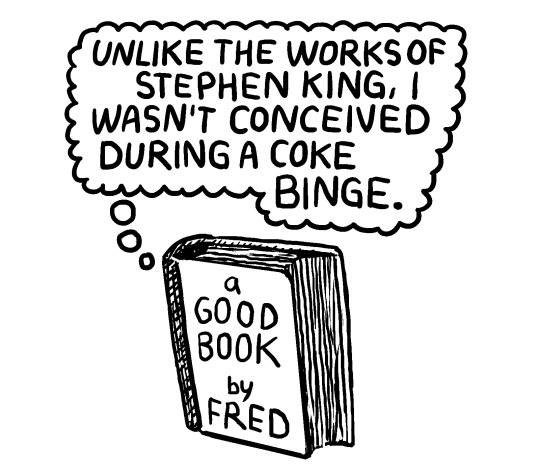
I decided to start writing a book. A novel, it’s going to be fiction. It’s a big project. I dread big projects. I don’t feel as if I am ever able to complete them. It’s going to be left unfinished, why do I even bother? So many projects that I’ve started and never finished. I get an idea, then I can’t make myself do the actual work to make it a reality. Why do I think I can write a book when I can barely read books without becoming distracted and doing something else instead? I give up too easily. But, then again, do I really have it in me to produce something that is good? That people would want to read? Insecurity creeps in, telling me that I will fail. I fear failure. Of course I do, who doesn’t? Whenever people say that their greatest fear is failure, all I wonder is who out there is not afraid of failure? Is there someone out there with so much confidence that they absolutely do not in any way fear failure? Even narcissists technically fear failure, it is what leads them to such ridiculous overcompensation, putting on the facade of bravado to mask their actual dire sense of insecurity. Do not fall for the scams, no person is truly without self-doubt. (Well, I guess maybe psychopaths, but there’s a whole lot of things amiss with them.)
Ever since I was a kid, I’ve entertained myself by coming up with stories, fictional universes that I would populate with characters of my own invention. When I was a kid, what I really wanted was to become a comic book writer and artist. Well, in between other gigs I imagined would suit me, including at one point wanting to be a “singing farmer,” as I put it. Still, I’ve always returned to fiction and storytelling. There’s something about creating a world that lets you so fully distract yourself from all the stressful daily hullabaloo that goes on around you. Escapism, it’s fun, it’s therapeutic, I think. There’s a reason why humans have been telling each other stories for millennia, since even before we lived in houses. Back when we were all huddled around the fire, wearing our best comfortable animal furs, sharing tales of the hunt. Your uncle who once took part in killing a mammoth, the impressive beast nearly gorging him with its big tusks. How clever he was when he noticed that the mammoth had one leg weaker than the others, and used that to his advantage. How the entire hunting party banded together to bring the behemoth down, getting all that meat to feed their families with for months! Stories make you feel good. Like as if you have something to celebrate, even when you might be starving due to the more recent hunts not having gone as well. Damn that saber-tooth tiger that killed your uncle…
Storytelling is linked to acting. Both with acting and with storytelling you have to commit. Whatever you are doing, whatever role you are performing, you have to sell it. You may be on stage talking about that time you went scuba diving with your future wife, and how you encountered an oyster with the most magnificent pearl inside, and how you made a ring for the pearl and used it when you proposed to her. You have to sell it. You have to get the audience laughing, gasping, crying, going “aww,” feeling as if they were there with you that day. Of course, they don’t know it is all just lies. You made it up. It’s all fiction. But you committed, so they won’t ever know. Storytelling is a gift to others, people will appreciate you if you tell good stories, but you’re also kinda deviant. Even if it’s technically based on a true story, you’ve certainly added your embellishments. You’re a trickster, a devious individual. No wonder actors have historically been seen as dubious folks. They come into town, romances all the young women and men, telling them big tales of their lives on the road, and they can’t possibly know if you are telling the truth or not. You may just be lying. You probably are lying. Let’s be honest, you’ve probably not told a single true thing in your life.
I am bad at the hustle. No, I can talk quite well, and I can keep people’s attention for a long while. But I can’t be a huckster. Going out there, putting myself on the line hoping people will swallow my bullshit. I can’t really avoid speaking from my heart when I do speak. Or when I write, as I happen to be doing now. This blog has so far been thoroughly candid in places, in such a way I may come across like I’m at a confessional. Not that I have much evil to confess, but I can’t help but be transparent. I can’t flip into different kinds of personalities, each with its own schemes and plots, being some master manipulator, someone who you can never figure out what they're truly up to, or what they truly want. No, what I am is clearly written on my face. I’ve got one self, and it is the one before you. He’s hairy, and tall, and a bit of a dork. I am happy to talk to you, to engage with you, but I won’t be anyone but myself. I am me. I hope that’ll do.
Of course you are familiar with all those pick-up artists that plagues the internet. Or well, not just the internet. Go into any old-fashioned bookstore (where they store books on paper, not in digital code,) and you are bound to find some sleazy book written by a sleazy guy about how to sleazily seduce women. Those books don’t want you acting like me. According to them, seduction is all about manipulation. To figure out the very right thing to say to get women to fawn all over you. They don’t want you to be sincere, telling the truth as you see it. Nah, you gotta keep that stuff bottled up, deep down inside your soul, because most likely, your true self is ugly. It’s interesting how you can get little details from these pick-up artists depending on the sort of things they say, the tips they provide. The fact that all of them seem to harbour this festering misogyny is no big surprise, but every so often, you get these little glimpses of these people’s true worldview, one where power is everything, true love is a fallacy, and happiness is a lie manufactured by Hollywood to make us all into docile consumers. No wonder the “red-pill” so often leads to people taking the “black-pill.” First hucksters will lure you in, telling you that they’ve got the secret as to how to be a success, then when they’ve got you isolated, they reveal to you how truly misanthropic and bleak their actual beliefs are.
I am fascinated with cults, for much of the same reason why I am fascinated with storytelling. What is a cult leader if not just a great storyteller? They’re something like the modern day shaman, capable of spellbinding people with their weird idiosyncratic way of speaking. High-functioning people with autism are often said to have an idiosyncratic way of speaking. No, I am not suggesting that cult leaders are all somewhere on the spectrum, though it wouldn’t surprise me if some famous cult leaders did turn out to have been on the spectrum. However, for an autistic person to become a cult leader, I think they would have to be a true believer, and not some fraud just looking to scam others. Ultimately, no autistic person would want to surround themselves with people unless they truly do believe it is essential, to like, save mankind from damnation or something. It’s the difference between sincerity and insincerity. It is difficult for autistic people to be insincere, as insincerity requires a lot of social skills that autistic people struggle with. Having to juggle all these balls in the air, making sure you keep the big lie going, that you remember to change your behaviour depending on who you are speaking to in order to keep them from figuring out that you’re a bullshitter. Hollow people are great at being insincere. People like L. Ron Hubbard, the founder of the highly profitable cult that is Scientology, was at his core a hollow individual. He had no problems twisting the minds of the people around him, because he never felt a need to be sincere. If an autistic person were to become a cult leader, I can guarantee you that it wouldn’t be a profitable cult. Nah, autistic people aren’t in it for the money, we’re all about keeping it real.
Being a sincere person, surely I should be able to write a novel and make it feel earnest. Like it was delivered with passion, because I wouldn’t be able to write anything that wasn’t true to myself. Well, I do hope so. Having something I’ve made be referred to as genuine is something I see as a great compliment. I’m a student of art history, I’ve made some “serious” art before, I know how terrible art can be when it is not delivered with good faith. Sure, some art is cynical, or ironic, but even then, it tends to come from a real place. Good artists, even when they’re fully armed with the dada mindset, must believe in what they are doing. Whether they are doing it for a laugh or not, that’s irrelevant. Even if all you wish is to be silly and make something that is comical, you have to believe in what you are creating. Or else people won’t bother engaging with it. Why look at a painting by someone who is just interested in making money? Insincere artists do exist, and they can end up becoming quite successful, but ultimately, history won’t be kind to them. Damien Hirst comes to mind, heard he's into NFTs now.
Sure, I don’t like insincere people. Does that make me a bigot? Like, it’s not as if they can help themselves. It’s just who they are, spineless maggots with no soul. It doesn’t mean we have to hate them. No, no, no... I am just generalising. Don’t go thinking there’s just two kinds of people in the world, the sincere and the insincere. It’s not a binary. Most people are both, just like with introverts and extroverts, humans are complex. But there are definitely those that decide to feed into their insincere side, realising that it is often the key to success. Through insincerity, you learn to let go of self-doubt, you stop worrying so much about what others think of you, because you are never truly yourself. If they hate you, then so what? They don’t actually hate you, they just hate a role that you are playing. So what if you seduced that woman, made her feel as if you were the perfect match, then you ghosted her and completely forgot about her? It’s her fault for falling for your tricks. You were clearly just playing the game, being a super-seducer, she should have known better. By embracing insincerity, it’s like gaining a superpower. No longer do you have to care about the impact you have on others, no longer do you have to worry about what it means to be a social human being making choices that affect the others around you. Because you’re not the person they think you are. Actually, you’re not quite sure you’re the person you think you are… Who are you?
I’ve got the plot all laid out in my head for the novel. It’s going to be based in the fantasy world that I’ve been working on for the last few years. I’ve been working on this world for almost half a decade now, come to think of it. Why do I keep feeling as if I am never able to keep to a project, when I’ve clearly been working on a massive project all this time? Sure, it’s all just in my head, but it’s not as if most people have the kind of patience to keep going back to a single big project, even if it is just in their head. Not once, while thinking about my fantasy world have I been distracted and started thinking about cute puppies, instead. And you know how difficult that is. Maybe I am too hard on myself. Maybe I will finish this book, and maybe people will want to read it. Maybe it will even get a minimal number of angry reviews, like, I may get a book published without some folks trying to harass me into committing suicide for daring to think I can write. Some people may even be enthusiastic, blowing up my ego with great praise. Maybe someone will come along and tell me that they want to buy the rights to make my book into a movie or a television series. Maybe I will get rich? Maybe I will get famous! Woo! Success here I come!
Well, no, here I go being insincere. That’s not what it’s about. I should be writing this book because I want to write it. Because I want to prove to myself that I am able to write it. Sure, it’s not as if there’s not a little brain goblin inside my mind whispering sweet nothings about how one day I might turn out a real respected author. One with real fans that gets to do big book tours talking about how brilliant I am, how brilliant my work is, and how brilliant things are going for me. I am not going to pretend I don’t have the same aspirations for success that others have. Inside of me you will find the same greedy piglet of an ego hungry for more adoration and more validation that you will find in any person. Humans don’t know when to quit, we always want more. But I am at least safe knowing that I will never debase myself, descending to the same depths as those inhabited by soulless grifters who go through life abusing the trust of others in order to get by. I’m sincere, in the end. I always turn out sincere, in the end. I am a good boy.
And I am also really sexy. I don’t think I’ve mentioned this before on this blog, but I am really, REALLY, sexy. Like, you wouldn’t believe it. Oh, I am so hot. And if you follow and subscribe and hit that bell, I will teach you how you can be just as sexy as I am! And buy my book! And my merch! And my new single! And of course, my new cryptocurrency, by the name of “autism-coin.” It’s going to be a real success on 4chan, let me tell ya!
8 notes
·
View notes
Text
Santa Claus and the Nature of Belief
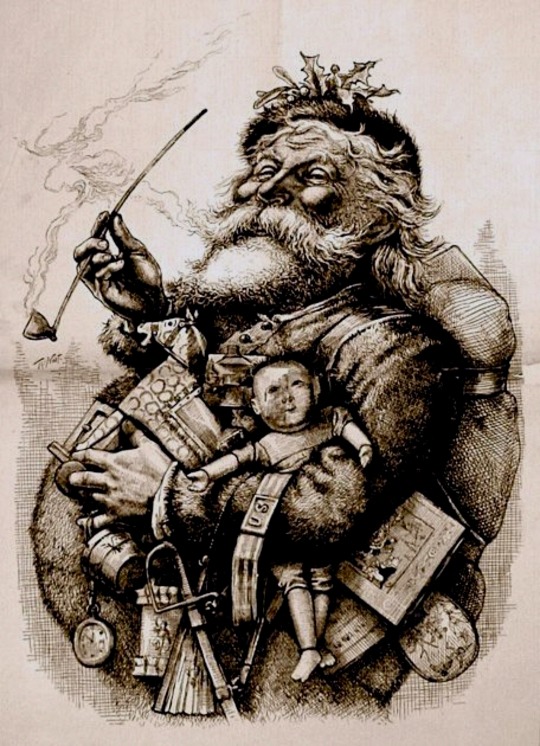
I doubt anyone will read this thing, but here's my not-so-little essay: God is as real as Santa, and Santa is as real as God, and I don't say this in a negative way.
Every holiday season I end up reflecting about Santa and the nature of belief as a whole.
We tell our kids to believe in Santa, and generally we try to protect that belief for as long as we can. A frequent theme in Christmas movies is the kid or adult that don't believe in Santa Claus, but by the end of the movie their faith is restored and magic can be sensed everywhere.
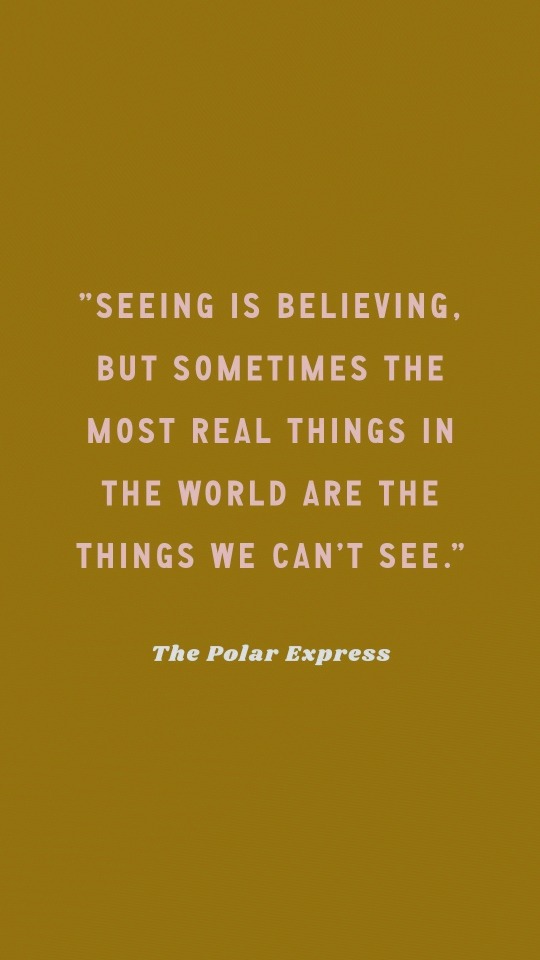
And I wonder, what was all that truly about.
Yes, Virginia. There's a Santa Claus

This is the most reprinted newspaper editorial in the English language, and one of the most important pieces of Holiday lore in North America.
Virginia O'Hanlon was the daughter of a coroner's assistant, Dr. Philip O'Hanlon. In 1897, at eight years old, she asked her father if Santa Claus existed. Her father recommended that she send her question to "The Sun", a very important newspaper from New York City, which ran from 1833 until 1950. This was her original letter.

For the surprise of everyone involved The Sun responded the question of the little girl. As far as I can see there was no utterior motive. The paper ran the editorial in the seventh place on the page, below even one on the "chainless bicycle". But it was noticed by the readers. It became almost a legend.
What is important about the story is that the author of the editorial was Francis Pharcellus Church. This man was a war correspondent during the American Civil War. He saw pain, death, misery and despair.
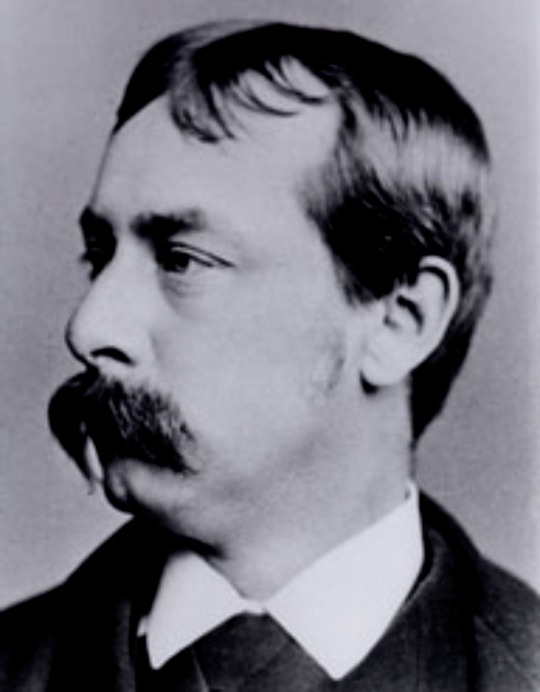
"The Rest of the Story", a radio program that presented little-known or forgotten facts of History, described Church as a hardened cynic and an atheist who had little patience for superstitious beliefs. Initially, he didn't wanted to write the editorial. He even refused to allow his name to be attached to it.
His other writings typically espoused hardened cynicism, skepticism toward religion and superstition. Yet, his most memorable work celebrates faith.
Was he forced to write this thing? Why someone so contrary to blind faith and superstitious beliefs would try so hard to protect and legitimate the beliefs of a young girl? We will never know the answer.
Santa as a metaphor for God.
Mr. Kringle is not concerned for himself, if he was he wouldn't be here. He is in this regrettable position because he is willing to sacrifice himself for children. To create in their minds a world far better than the one we've made for them. If this is, as Mr. Collins suggests, a masquerade then Mr. Kringle is eager to forfeit his freedom to preserve that masquerade. To subject himself to prosecution to protect the children's right to believe. If this court finds that Mr. Kringle is not who he says he is, that there is no Santa, I ask the court to judge which is worse: A lie that draws a smile or a truth that draws a tear.
Miracle on 34th Street
To believe in something even when it doesn't make sense or when you don't have proof. This is a frequent theme in Santa movies. Many use Santa as a commentary on the nature of faith and use him as metaphor to the Christian god. No one took it so far as the 1998 remake of Miracle on 34th street.
The final proof on court that Kris Kringle may not be crazy is that since the US Department of Treasury can put "In God We Trust" on US currency with no hard evidence, then the people of New York can believe in Santa Claus in the same way.
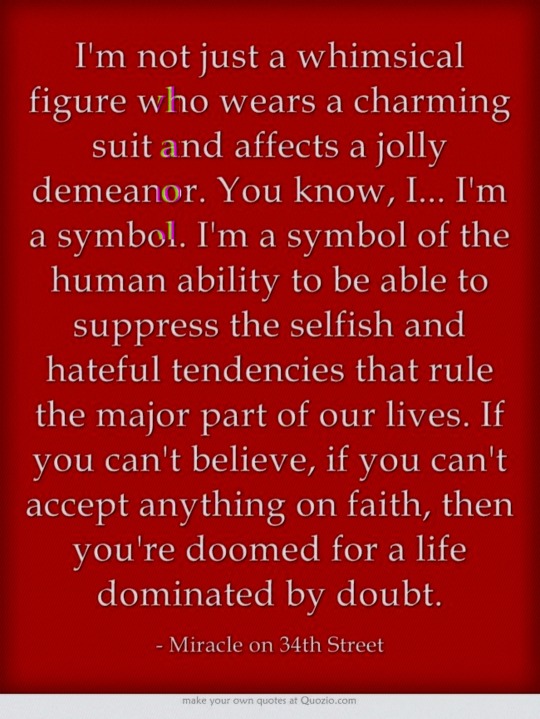
The "Hogfather" and Terry Pratchett
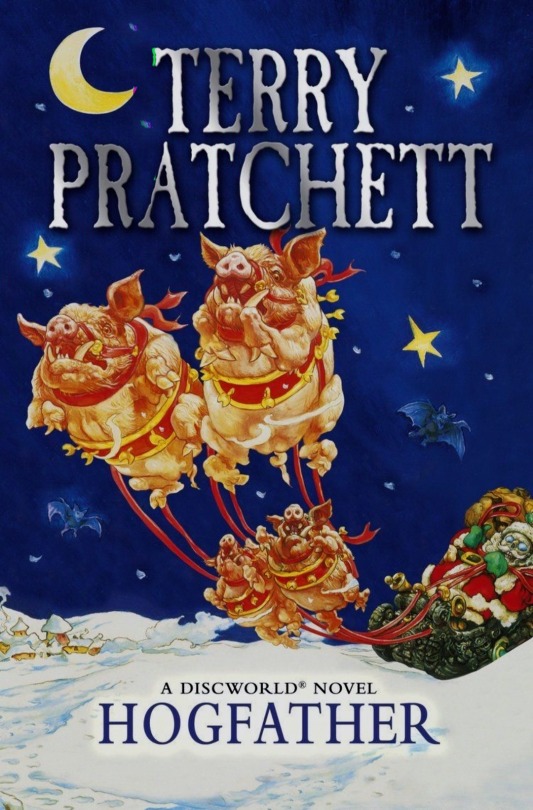
I wrote this essay because I recently read the "Hogfather" by Terry Pratchett, and he basically wrote the best argument for faith and belief that I've ever seen.
First, there's this dialogue exchange:
"There are many who say this... person does not exist," he said.
He must exist. How else could you so readily recognize his picture. And many are in correspondence with him.
Well, yes, of course, in a sense he exists..."
In a sense everything exists
But this one takes the cake. This dialogue is between Susan Sto Helit and her grandfather Death, the best character in the book mind you. This is after they save the Hogfather, the Discworld version of Santa.
Susan: Thank you. Now...tell me...
Death: WHAT WOULD HAVE HAPPENED IF YOU HADN'T SAVE HIM?
Susan: Yes! The sun would have risen just the same, yes?
Death: NO
Susan: Oh, come on. You can't expect me to believe that. It's an astronomical fact."
Death: THE SUN WOULD NOT HAVE RISEN
Susan: It's been a long night, Grandfather. I'm tired and I need a bath! I don't need silliness!
Death: THE SUN WOULD NOT HAVE RISEN
Susan: Really? Then what would have happened, pray?
Death: A MERE BALL OF FLAMING GAS WOULD HAVE ILLUMINATED THE WORLD.
Susan: All right, I'm not stupid. You're saying humans need...fantasies to make life bearable.
Death: REALLY? AS IF IT WAS SOME KIND OF PINK PILL? NO. HUMANS NEED FANTASY TO BE HUMAN. TO BE THE PLACE WHERE THE FALLING ANGEL MEETS THE RISING APE.
Susan: Tooth fairies? Hogfathers? Little—
Death: YES. AS PRACTICE. YOU HAVE TO START OUT LEARNING TO BELIEVE THE LITTLE LIES.
Susan: So we can believe the big ones?
Death: YES. JUSTICE. MERCY. DUTY. THAT SORT OF THING.
Susan: They're not the same at all!
Death: YOU THINK SO? THEN TAKE THE UNIVERSE AND GRIND IT DOWN TO THE FINEST POWDER AND SIEVE IT THROUGH THE FINEST SIEVE AND THEN SHOW ME ONE ATOM OF JUSTICE, ONE MOLECULE OF MERCY. AND YET YOU ACT AS IF THERE IS SOME...SOME RIGHTNESS IN THE UNIVERSE BY WHICH IT MAY BE JUDGED.
Susan: Yes. But people have got to believe that, or what's the point—
Death: MY POINT EXACTLY.
And it continues...
Death: THERE IS A PLACE WHERE TWO GALAXIES HAVE BEEN COLLIDING FOR A MILLION YEARS. DON'T TRY TO TELL ME THAT'S RIGHT.
Susan: Yes, but people don't think about that. Somewhere there was a bad...
Death: CORRECT. STARS EXPLODE, WORLDS COLLIDE, THERE'S HARDLY ANYWHERE IN THE UNIVERSE WHERE HUMANS CAN LIVE WITHOUT BEING FROZEN OR FRIED, AND YET YOU BELIEVE A BED. IT IS THE MOST TALENT."
Susan: Talent?
Death: OH, YES. A VERY SPECIAL KIND OF STUPIDITY. YOU THINK THE UNIVERSE IS INSIDE YOUR HEADS.
Susan: You make us sound mad. A nice warm bed...
Death: NO. YOU NEED TO BELIEVE IN THINGS THAT AREN'T TRUE. HOW ELSE CAN THEY BECOME?
Belief makes us human
It doesn't matter which religion is the true one because no one is. At the same time, all of them are.
Religion is about humans in the past finding patterns in the chaotic world, and trying to survive through it. By believing there's a order in the world, they were able to bring order to their communities and to their personal lives.
Belief is part of our nature. It's our way of understanding the world, of making sense of it all.
These characters and stories in a sense are very much real. They are metaphors for the forces we struggle with in our daily lives, the eternal hardship that is to be human
They don't have to be absolutely real to mean something. Think about your favorite character. They aren't real, but what they represent, best, what they represent to you, this is very real.
Listen, I not advocating for complete abandonment of logic and reality. Today we have a very serious problem with people who completely disregard facts and cults. They consume fake news, they believe in stupid pseudo-science and by refusing critical thinking they put others into danger.
And then there are the Christian fundamentalists, that by all talk about "Religious Freedoms", they really meat forcing their belief system in others and control what people can or cannot believe.
Facts and logic are very important. Always believe in the Science. And, I can stress this enough, Critical Thinking is ESSENTIAL to escape con artists and charismatic cult leaders.
But you can force people to live by only what it can be proved. We aren't robots. There will always be a hole that rationality alone won't be able fill. A deep existential hole that If left unchecked will destroy you bit by bit.
I'm not saying "You need to convert" or "You need religion". But there's clearly something way deep and transcendental in these rituals and stories.
I don't really believe in God and the supernatural. I say that as a gay men who had a lot issues with my overly religious parents. But the gods and these rituals and stories clearly mean something, and I think we shouldn't dismiss the living experiences of these people as just mere superstitions, be then christians, muslins, jews, Wiccans, neopagans, hindus, etc.
Belief certainly brought something to their lives, and certainly they know something we don't.
If your faith makes you happy, if it helps you bring order to your life, if helps you appreciate the world better, if it doesn't force you to discriminate, your faith is completely and integrally valid, and you don't have to prove it to anyone
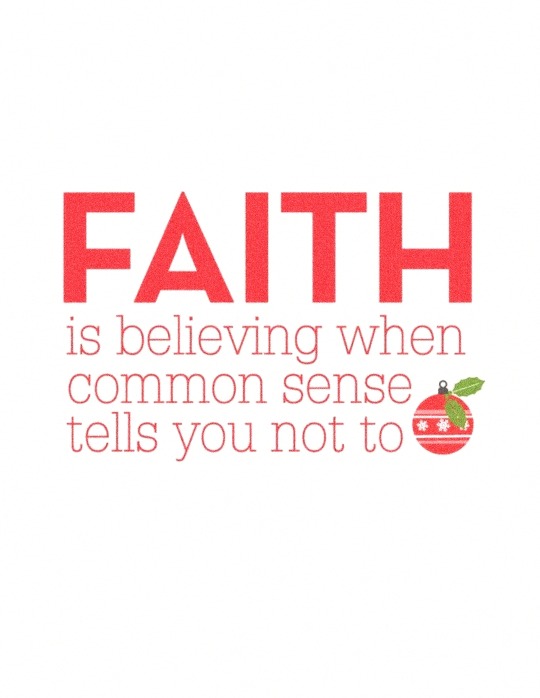
#christmas#holiday season#terry pratchett#Hogfather#Yes Virginia There is a Santa Claus#faith#santa#santa claus
23 notes
·
View notes
Text
Jojo Rabbit (2019)

Who says you can't laugh about the Holocaust? Certainly not Taika Waititi.
The Hunt for the Wilderpeople director’s latest film Jojo Rabbit, set in Nazi Germany with a fanatical Hitler youth at its center, is uproarious, funny, and anything but glib. The story follows 10-year-old Jojo Betzler (played by the effortlessly charismatic and magnetic Roman Griffin Davis), who idolizes Adolf Hitler so much that Hitler (played by Waititi) has become his imaginary friend, popping up like a proverbial devil-on-one’s-shoulder during random moments of turmoil to comfort and counsel our budding young Nazi.
Jojo’s dedication to the cause is unwavering. Thanks to some imaginative Nazi propaganda, Jojo is convinced that his purpose is to exterminate Jews, whom he envisions as winged creatures that eat children and hoard anything shiny. Alas, after playing cavalier with a grenade at Hitler youth camp, Jojo suffers an accident that renders him unfit to keep training with the other children, including his best friend Yorki (played by the adorably precocious Archie Yates). He’s promptly sent home, where his angst grows due to being isolated from his Jew-hating peers. To add insult to injury, he discovers that his mother Rosie (Scarlett Johansson) has been hiding a Jewish girl in their home. Outraged and beside himself with indignation, Jojo hatches a plan to get rid of the Jewish girl, seizing it as an opportunity to prove himself as a true Nazi believer to his peers.

Jojo embarks on quite the character arc, and Waititi once again proves that he is a masterful director when it comes to working with children. His ability to elicit the purest, most delightful performances from child actors is amazing (just as he did in Hunt for the Wilderpeople), and the audience swiftly finds themselves endeared to Jojo and the rest of the cast. Performances from everyone were delightful, with Waititi allowing each actor (such as Johansson, Sam Rockwell, and Rebel Wilson) to bring their signature flairs to their characters. While the film is approached mostly as a period piece from an aesthetic standpoint (with costumes, set design, and color palettes largely faithful to the period), Waititi’s deliberate choices in making it anachronistic serve two purposes: to punctuate the satire, and to help make what should be a very sobering subject matter more approachable.
The story, a loose adaptation of the book Caging Skies by Christine Leunens, while quirky and sweet certainly doesn't shy away from the real horrors of the holocaust. It’s a tightrope walk to juggle humor and atrocity, but Waititi makes it seem natural. He also knows precisely how to tug at heartstrings without being melodramatic. Jojo Rabbit’s triumph is ultimately in its ability to treat the topic of ideological extremism with the ridicule it so often deserves while at the same time provoking interesting questions about why people get sucked into blindly following charismatic demagogues, entrenching themselves in hate-filled cults, and spouting toxic ideologies. The best part? Waititi does this with so much thoughtfulness and nuance, all while serving up an entertaining, poignant story.
By the end of Jojo Rabbit, you’re not raising your pitchforks screaming about the injustice of the Holocaust—that would be rather trite. Instead, you’re reminded that humans are complex, multi-dimensional, and capable of both immense kindness and unbridled terror. It’s a celebration of people’s capacity to change their minds. More importantly, it’s a reminder of the beauty of comedy and how laughter can be the best medicine during turbulent times.
(More—including spoilers—under the cut)
What I love most about Jojo Rabbit is the depth of each character and how there’s so much to dissect and unpack for each one. Beginning with Jojo—we learn that not only is his father far away, in danger, fighting somewhere on the frontlines, but that he also lost his older sister Inge. We’re never told in full detail what happened to her, but the main takeaway is that her death, coupled by the absence of Jojo’s father, were tragedies that may have propelled Jojo to seek out the philosophy of the Third Reich. It’s not uncommon for young fanatics to get swept into hate groups when they are at their lowest points. When you’re angry or feeling helpless and lonely, it’s easy to externalize your pain and find someone to blame, whether it’s an entire gender, people of certain ethnicities, or members of a different political party. It’s simpler, you see, instead of owning one’s problems and acknowledging that the world doesn’t revolve around you. By making boogeymen out of people who are easy targets, we assert control over the senseless things that happen in our lives. It’s a way to feel powerful.
When you’re young, there are so many things that are out of your control. You’re caught in this torrent of everyone else’s decisions—your parents, school, your peers, society at large—and you’re looking around, flailing and hyperaware, that you’re living what is supposed to be your life and yet there seems so very little that you have ownership of. That's Jojo’s story. Not only is he caught in the middle of a war, but he’s grappling with some seriously heavy shit: an absentee father, a dead sister, a craving for acceptance from his peer group and, ultimately, a longing for connection that is rooted in positivity rather that hate.

At first that connection seems to be cultivated by his mother, Rosie, who is literally and figuratively the most vibrant character in the film. From her bold, striking fashion sense and rouged lips to her joie de vivre, Rosie is, to quote Mulan, a flower that blooms in adversity. Even during the bleakest of times, she finds ways to uplift her son, whom she can tell is hurting. Her bursts of energy, her ability to find excitement and enthusiasm even in the most mundane of things, her rally to dance in the face of tragedy—all were reminders that dwelling on hatred and sorrow, while easy and sometimes necessary, is a crutch in a balm’s disguise. We must always forge ahead and seek hope when all feels lost, like “staring a tiger in the eyes”, as Rosie would say. That’s why, despite the risks of being caught by the Gestapo, she housed a Jewish girl in her home. In some small way, she was doing her part in the resistance against a hateful movement. While Rosie says she’s never stared a tiger in the eyes, her act of defiance came at great risk to herself, and that’s true courage.
In one of the most heartbreaking scenes in the film, Jojo is wandering the streets when he notices a bright, blue butterfly fluttering against the backdrop of hate-filled propaganda smattered on the city walls. He chases it wistfully and accidentally stumbles on the gallows in the middle of the town square. All the audience sees, hanging from the gallows, is a pair of legs with bright-colored shoes, and our hearts immediately sink. It’s Rosie. Waititi leads up to this shocking moment during a previous scene, while Jojo and Rosie are hanging out by a river. Rosie makes fun of Jojo for still being unable to tie his own shoes. She’s skipping gleefully on top of a concrete wall, with the camera trained low at Jojo’s eye-level, so the audience sees a shot of her shoes as she taps into a merry little dance. Waititi counts on viewers remembering this quiet scene to make what follows truly devastating. The effect is quite heart-stopping, and it’s impossible to want to reach out and give poor Jojo a hug as he cries out and wraps his arms around his dead mother’s feet. It’s then that Waititi makes his message known: Yes, there’s plenty to make light of in the world, but you can do this while also acknowledging that there’s plenty of darkness. It’s an impressive balancing act, and Waititi does it with so much wonderful exuberance and earnestness that it’s tough not to commend.
Viewers notice that the more Jojo focuses on the positive things in his life—his mother, his new Jewish friend Elsa—the less we see of his imaginary friend Hitler. And this is a deliberate choice by Waititi to prove a point: when you are consumed with hate, you’ll want to constantly keep feeding it because it’s comfortable and easy. As humans, we have a biological negative bias that we rely on as a means of survival. The very idea of entropy exists as a reminder that it takes more work to put things in order, to be good, to rise above, than for things to decay and distort and devolve. The more you fill your life with things that bring you joy, fulfillment, and contentment, the less you’ll rely on poisonous literature and toxic people. While this isn't exactly an epiphany for most of us, one may applaud Waititi for the inventive way he delivers this message.
Another delightful character who, on the surface, seemed to be solely there for comedic effect, was Sam Rockwell’s Captain Klenzendorf, who’s tasked with whipping up these little rascals into Nazi-fighting shape. From the very get go, we sense that this man’s commitment to the Nazi cause is entirely for appearances’ sake. From his clandestine romance with his right-hand man (played by Games of Thrones’ Alfie Allen) to his soft spot for Jojo, the audience is led to believe that this man is merely pretending to be a hard-ass because that’s what you were expected to do, else be accused of treason to your nation. One could assume his affection for Jojo had something to do with being able to sympathize with the young boy after Jojo is relegated to doing simple jobs due to his injury (Klenzendorf claims he was benched from the frontlines because of an injury that led to him having a dead eye). But it’s toward the end of the film where we fully realize the totality of his character. In an earlier scene, Jojo is bullied by some older boys into killing a rabbit. They jeer at him as he wrestles with the decision to kill an innocent animal. He’s torn between wanting desperately to ingratiate himself into his peer group and staying true to the part of himself that’s kind, pure, innocent, and staunchly against needless violence. The music builds as we lean forward in our seats waiting to see what Jojo does. He decides on an act of mercy at his own expense, releasing the bunny and yelling at it to flee from danger. Unfortunately, before it has a chance to escape, the bunny is snatched up by one of the older boys, who wrings its neck in front of all the young boys to see.
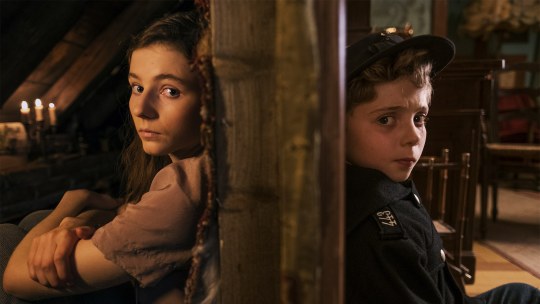
At first this seems like a scene that’s simply supposed to be an obnoxious display of bravado. But Waititi calls back to this scene towards the end of the film twice. Klenzendorf arrives at the Betzler household when it is being searched and ransacked by the Gestapo, who suspect Rosie has been aiding Jews. Jojo is terrified, not just to be discovered as traitors by the Gestapo but for Elsa’s (the Jewish girl they have been hiding who has now become his friend) safety. To get ahead of the situation, Elsa emerges from her hiding place and pretends to be Jojo’s dead sister Inge. When the Gestapo demand her paperwork, she shows them Inge’s old ID card. Klenzendorf immediately intercedes, grabs the ID from her hand and demands that she variate her identity by stating her birthday. Elsa stammers in response. “Correct,” Klenzendorf confirms flatly. The Gestapo consider this acceptable and vacate the premises, none the wiser. We discover immediately that Elsa had actually given the wrong birthdate, and Klenzendorf could have outed her right then, but decided not to. He was helping the bunny escape.
In another scene, when the Allied troops march into Germany and start rounding up all the Nazi soldiers, Jojo (who has a Nazi officer’s jacket on) is mistaken for one of them. He runs into Captain Klenzendorf, who creates a commotion by wrenching the Nazi jacket off of Jojo’s back and pushing him away, telling him to flee while yelling at him for being a dirty Jew so the Allies don’t execute him. It was an act of sacrifice from a man who recognized himself in the young boy. Klenzendorf saw Jojo’s gentleness and purity of heart and knew this kid needed to live. He released the bunny, stared a tiger squarely in the eyes—at the expense of his own life.
Jojo Rabbit, while certainly laugh-out-loud funny and full of amusement, is a moving story about heroism from a group of people who rarely ever get acknowledgment for their acts of bravery. These were Germans who defied their Führer and their Aryan brotherhood at great risk to their own lives. While these acts will never erase the horrors of the Holocaust, it’s a reminder that people are complicated creatures, capable of miraculous acts of mercy and horrific deeds of violence. It implores us to think about how some of the people that get caught up in hate groups are hurting deeply and just looking for something to blame their pain on. It definitely doesn’t excuse their actions or the bile they oftentimes spew, but it merely reminds us that behind every caricature is a human being in pain.
Even if you see Jojo Rabbit and don’t think it’s that deep—you may say “Starr, it’s just a comedy about stupid Nazis, it’s not even a true story”. What is true about it is that we live in a world of grey, and while it may be simpler to put people in buckets of black and white, hero and villain, good and bad, more often than not we are all just hurting in some way. What’s true about it is that we have more in common than we have differences and ultimately, everyone regardless of race, creed, sexual orientation, craves the same thing: freedom; Freedom from the burdens that we carry on our shoulders, from dead loved ones to strife and war. Freedom from the fear of persecution for being who we are. The freedom to wear whatever we want, screw whomever we want, and to dance like no one’s looking.
242 notes
·
View notes